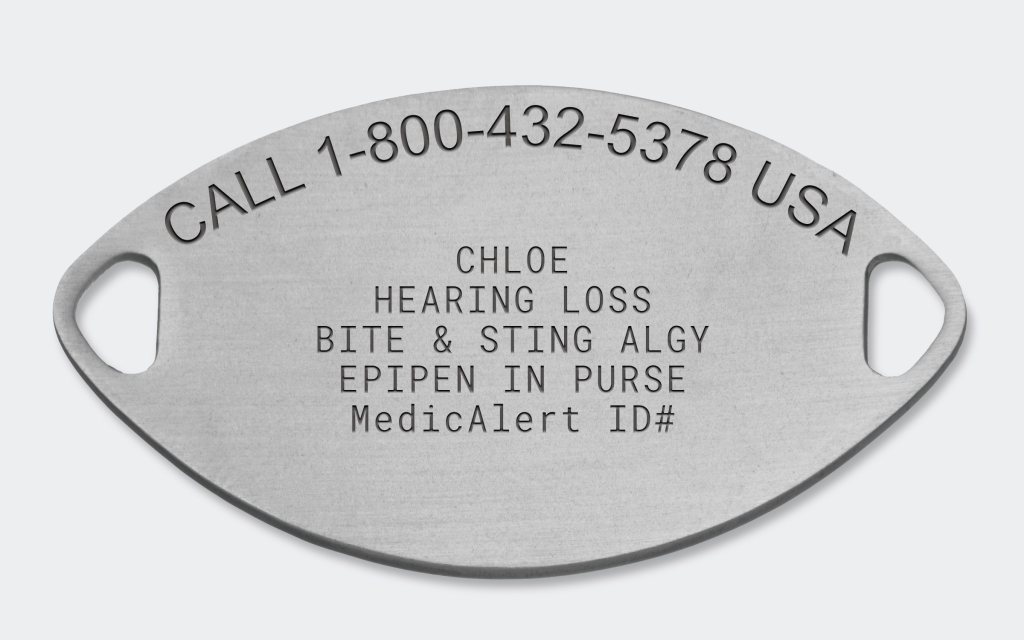Help others help you. Wear a medical alert ID bracelet or necklace engraved with important information for emergency responders and healthcare providers
Centers for Disease Control & Prevention

Medical IDs for Hearing Loss
The confidence to live with hearing loss
More than 1.5 billion people around the world are living with hearing loss. The World Health Organization (WHO) reports that this number could rise to 2.5 billion by 2030. A person has hearing loss if they can’t hear as well as someone with normal hearing. Hearing loss can affect one or both ears, and it can be mild, moderate, severe, or profound. A person with profound hearing loss is unable to hear any speech at all, but they can hear very loud sounds. Any degree of hearing loss can impact a person’s ability to communicate with others. This is why people living with hearing loss should wear a MedicAlert medical ID.
That’s why a medical ID for hearing loss is so important for people living with the condition.
How MedicAlert protects those living with hearing loss
One thing you shouldn’t worry about is what could happen if there’s an emergency. MedicAlert’s protection plans offer benefits that extend beyond the ID, providing safety and peace of mind for people living with hearing loss, their families and caregivers.

24/7 Emergency Response
Our team provides first responders the information they need to provide fast, accurate care.

Digital Health Profile
All your vital information, all in one place for you and your caregiver.

Emergency Contact Notification
In an emergency, we connect families so that no one is alone in a crisis.

Patient Instructions
Share the information that’s important to your care, such as use of rescue medications or contraindication for tests like MRIs.
Pair a medical ID for hearing loss with the protection plan that’s right for you.
What is hearing loss?
Around 48 million Americans have some degree of hearing loss. Exactly how many children in the U.S. have hearing loss is unknown. However, studies conducted by the Centers for Disease Control and Prevention (CDC) show that approximately 1 to 3 per 1,000 children in the U.S. have hearing loss. Other studies show rates from 2 to 5 per 1,000 children. Hearing loss is also listed as one of the six major types of developmental disabilities in children. While many children with hearing loss are born with it, others may develop the condition later in life. Hearing loss can also run in families.
Hearing loss can occur when there is a problem in the hearing part of the brain, a problem with one or more of the ears three parts (external, middle, and inner), or problems with the nerves coming from the ears. A person living with a hearing impairment may be able to hear some sounds or nothing at all.
Researchers at Johns Hopkins Medicine list three basic categories of hearing loss: sensorineural hearing loss, conductive hearing loss, and mixed hearing loss.
Sensorineural hearing loss is the most common type of hearing loss. It occurs when the inner ear or the actual hearing nerve itself becomes damaged. This loss generally occurs when some of the hair cells within the cochlea (contains the sensory organ of hearing) are damaged. Sudden sensorineural hearing loss is another form of sensorineural hearing loss that occurs very suddenly or over the course of a few days.
Conductive hearing loss occurs in the outer or middle ear where sound waves are not able to carry all the way through to the inner ear. Sound may be blocked by any number of substances, infections, abnormalities, or an injury.
Mixed hearing loss is a combination of both sensorineural and conductive hearing loss. People with mixed hearing loss may have a sensorineural hearing loss and then develop a conductive component in addition.
What causes hearing loss?
Hearing loss has many causes. Sensorineural hearing loss can be the result of aging, injury, disease, certain drugs, an inherited condition, or even exposure to loud noise. In fact, more than 1 billion people around the world aged 12-35 are at risk for hearing loss due to recreational exposure to sound. Others are at risk due to occupational noise or serving in the military. Hearing loss is the most common disability among American veterans, with some 2.7 million receiving disability or treatment for the condition.
Conductive hearing loss can be caused by earwax or a foreign object lodged in the ear canal; impacted fluid in the middle ear space fluid; an abnormality in the incus (anvil)—the small bone on the middle of the ear; a ruptured eardrum or other eardrum injury; or infections, bacteria, and viruses that cause inflammation and fluid buildup in the ears. Conductive hearing loss is most common in children who may have recurrent ear infections or who insert foreign objects into their ear canal.
What to engrave on MedicAlert medical IDs for hearing loss:
MedicAlert offers free custom engraving on all our hearing loss bracelets and medical ID products. Engravings on medical IDs for hearing loss should include any critical medical information that can protect and save lives in an accident or medical emergency, for example:
- Hearing loss, other conditions
- Emergency contact information
- Hearing aid or implanted device such as bone conduction implant

Sample engraving. Consult our team if you need help engraving your medical ID for hearing loss.
What are the symptoms and complications of hearing loss?
Hearing loss can cause a host of symptoms that can have a negative impact on day-to-day living, learning, and communicating. Symptoms of hearing loss can be frustrating for the person living with it and their loved ones. The most common symptoms of hearing loss include:
- Avoidance of certain social settings.
- Difficulty understanding words, especially against background noise or in a crowd.
- Frequently asking others to speak more slowly, clearly, and loudly.
- Muffling of speech and other sounds.
- Needing to turn up the volume of the television or radio.
- Trouble hearing consonants.
- Withdrawal from conversations.
Recent research from Johns Hopkins Medicine (Johns Hopkins) found that a person living with hearing loss can also have problems with walking, which could lead to falls. Studies conducted at Johns Hopkins also found that mild hearing loss doubled dementia risk, moderate loss tripled risk, and severe hearing loss resulted in a fivefold greater risk of developing dementia. Other complications associated with hearing loss include:
- Accelerated cognitive decline.
- Cognitive impairment.
- Depression.
- Higher risk of Alzheimer’s.
- Social isolation.
Hearing loss can also make it difficult to learn. Even mild hearing loss in children can cause them to miss 50% of classroom discussion. If left untreated, hearing loss can also cause a decline in mental sharpness, anxiousness, impaired memory, increased mental strain, and even financial difficulties.
How medical IDs for hearing loss combined with MedicAlert Membership provide peace of mind
If a person with hearing loss is in an accident or has another medical emergency, they can have difficulty communicating the details of their condition or other information important to their care. A MedicAlert medical ID lets emergency responders and ER doctors know that you are living with hearing loss, so alternative methods of communication can be employed. A MedicAlert ID can also help your rescue team get in touch with loved ones and other emergency contacts.
When paired with a MedicAlert protection plan, our hearing loss bracelets and medical IDs become even more valuable in emergency and other medical situations. A MedicAlert protection plan can ensure accurate and fast care by providing detailed information about your condition, your full health profile, designated physician information, details about current treatment plans and any other conditions, and other vital information about your care. With a MedicAlert ID and protection plan, you will always have a voice in an emergency.
- We’re your voice: If you can’t speak for yourself due to a medical emergency, your ID will speak for you – informing others about your hearing loss and any medications you’re taking.
- 24/7 emergency protection: In an emergency, the MedicAlert team will relay all of your critical medical information to first responders, no matter where or when your emergency happens.
- Always connected: You should never be alone in an emergency. That’s why MedicAlert will reach out to your designated contacts if you are unable to do so.
- Live with peace of mind and confidence: MedicAlert will be there for you every step of the way. You’ll have the confidence and freedom to live your life with hearing loss, knowing we’ve got you covered.
Sources: American Academy of Audiology; Centers for Disease Control and Prevention (CDC); Hearing Loss Association of America (HLAA); Johns Hopkins Medicine; Mayo Clinic; National Institutes of Health (NIH)-National Institute on Deafness and Other Communication Disorders (NIDCD); Stanford Medicine; World Health Organization (WHO)
DISCLAIMER: THIS WEBSITE DOES NOT PROVIDE MEDICAL ADVICE. The information in this article is presented for educational purposes only and is not intended as a substitute for professional medical advice, diagnosis and treatment. Always seek the advice of a physician or other qualified healthcare provider for any questions you may have regarding a medical condition or treatment.







